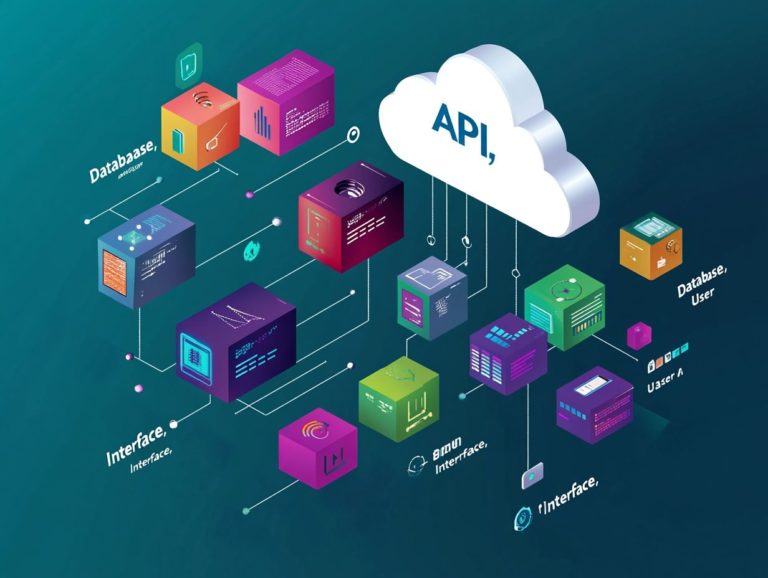PaaS Solutions for Startups: A Guide
In today s fast-paced tech landscape, you re navigating unique challenges that demand innovative solutions. PaaS has emerged as a game-changer for your startup, enabling you to streamline development processes, cut costs, and tap into advanced technologies.
This article delves into the numerous benefits of PaaS, such as scalability, flexibility, and effective implementation strategies tailored for your needs. You ll find key factors to consider when selecting a PaaS provider, complemented by inspiring case studies of successful startups that have harnessed this powerful tool.
Explore how PaaS can elevate your startup journey and transform your approach to development.
Contents
- Key Takeaways:
- Benefits of Using PaaS Solutions
- Choosing the Right PaaS Solution
- Implementing PaaS in Your Startup
- Case Studies: Successful Startups Using PaaS
- Frequently Asked Questions
- What are PaaS solutions for startups?
- How can PaaS solutions benefit startups?
- What are some popular PaaS solutions for startups?
- How do PaaS solutions differ from other cloud computing services?
- What are some considerations for choosing the right PaaS solution for a startup?
- Can PaaS solutions be customized for specific business needs?
Key Takeaways:
- PaaS provides cost savings and efficiency.
- Scalability and flexibility help adapt to changing needs.
- Consider cost, features, and ease of integration when choosing a provider.

What is PaaS and Why is it Important for Startups?
PaaS is a cloud computing model that gives startups like yours an easy way to develop, deploy, and manage applications. You won t have to worry about the underlying technology that supports your applications.
For startups like yours, PaaS offers key benefits such as reduced running costs, accelerated application development cycles, and easy availability for development tools and middleware. This can significantly level the playing field in competitive markets.
By leveraging PaaS offerings from leading service providers, you can focus on innovation instead of managing infrastructure, making it a transformative solution in today s tech landscape.
PaaS not only streamlines your development process but also incorporates essential features like automated scaling, integrated development environments (IDEs), and robust security measures. This allows you to easily adjust your resources based on demand, ensuring optimal performance during peak usage.
For instance, platforms like Amazon Web Services (AWS) offer Elastic Beanstalk for deploying web applications, while Google Cloud provides App Engine, simplifying the development process. Microsoft s Azure delivers a suite of tools that support a variety of programming languages, granting you the flexibility to choose the technologies that best suit your projects.
The adaptability and cost-effectiveness of PaaS for IoT applications can propel your startup into growth trajectories that might otherwise remain out of reach.
Benefits of Using PaaS Solutions
Utilizing PaaS for mobile app development solutions can provide your startup with a plethora of benefits, including substantial cost savings, enhanced scalability, and access to advanced security features—essential elements for efficient application development and deployment in today’s competitive landscape.
With PaaS, you can optimize your IT infrastructure, streamline software management, and leverage powerful monitoring tools that ensure your applications perform seamlessly.
This level of flexibility enables you to concentrate on your core business activities while enjoying the technological advantages that come with leading cloud solutions.
Cost Savings and Efficiency
One of the standout benefits of leveraging PaaS is the significant cost savings it offers, allowing you to manage running costs more effectively while enjoying a subscription-based service model that grows alongside your business.
By entrusting the management of your IT infrastructure to a PaaS provider, you can significantly lower service fees typically associated with traditional hosting and maintenance. This shift enables you to allocate resources more efficiently toward application development and innovative projects.
This model not only removes the burden of hefty upfront capital expenditures often tied to conventional setups but also provides predictable operating costs that facilitate smoother budget planning.
You can select plans tailored to your needs, adjusting your subscriptions as your business evolves, in stark contrast to traditional models with their rigid pricing structures and long-term contracts.
Take PaaS offerings like Heroku or Google App Engine, for example; they grant you access to powerful tools without the hassle of extensive server management. This flexibility enables you to pivot quickly, invest more in customer acquisition, and ultimately accelerate your growth trajectory.
Scalability and Flexibility
Scalability and flexibility are essential elements of Platform as a Service (PaaS) solutions. They enable you to adapt swiftly to changing market demands and allocate resources efficiently as your needs evolve.
By allowing multiple users to share the same platform and facilitating dynamic resource allocation, PaaS enables your business to scale applications seamlessly. This ensures optimal performance regardless of user load or fluctuations in demand.
This adaptability is crucial for emerging companies like yours, which often navigate unpredictable growth trajectories and market shifts.
With PaaS, you gain access to automated tools and development environments that streamline your workflows. This allows you to focus on innovation instead of getting bogged down in managing infrastructure.
By providing on-demand resources, PaaS enables you to pivot quickly in response to new opportunities or challenges while maintaining a consistent level of service.
Such a robust framework addresses your immediate needs and aligns with your long-term strategic goals, fostering a proactive approach to business resilience.
Access to Advanced Technology

Access to advanced technology can be a game-changer for your startup. PaaS offers a comprehensive suite of development tools, middleware (which helps different software connect), and application programming interfaces (APIs, which allow different applications to talk to each other). This can elevate your application development process.
By leveraging robust integration tools and business analytics, you can streamline your workflows and gain powerful insights that drive innovation. This enhances your competitive edge in the market.
These platforms typically come loaded with ready-to-use components, such as cloud databases and DevOps tools. This lets you focus on building features without getting bogged down in infrastructure management.
Services like GitHub for version control and Heroku for app deployment can significantly reduce the time it takes to move from concept to launch.
The predictive analytics tools provided by PaaS vendors enable you to make informed, data-driven decisions. Integrated machine learning frameworks can create smarter applications that adapt to user needs.
This ecosystem fosters creativity and provides essential resources for scaling your operations efficiently.
Choosing the Right PaaS Solution
Choosing the right PaaS solution can make or break your startup; don’t take it lightly! It requires thoughtful consideration of several key features and benefits.
Assess the type of cloud environment public, private, or hybrid available from potential service providers. Don t overlook their customization options and user management capabilities.
Evaluate how these elements impact your operational needs, scalability, and overall performance monitoring. Ensure that the PaaS you select aligns seamlessly with your long-term goals and objectives.
Factors to Consider
When selecting a PaaS solution, weigh various factors carefully:
- Reliability of the service provider.
- Type of cloud environment offered.
- Capacity to meet your scalability and security needs.
Evaluating resource allocation and integration of key features can significantly influence the success of your application development and deployment efforts. The provider’s track record with uptime guarantees is paramount.
For example, a startup that chose a highly reliable PaaS experienced a remarkable 30% increase in user satisfaction due to minimal downtime. Scalability shouldn t be an afterthought. Consider a young e-commerce company; they faced challenges when their initial PaaS couldn t handle a surge in traffic during rapid growth.
Security features, including data encryption and compliance certifications, hold considerable weight, especially in sectors like fintech, where a breach could spell disaster for your business.
In summary, a thorough evaluation of these factors will enable you to make informed decisions that enhance your startup s potential to flourish in a competitive landscape.
Top PaaS Providers for Startups
Several leading PaaS solutions for rapid prototyping are specifically designed to cater to startups, offering strong platforms that help you quickly build and launch apps.
Notable players in the market include:
- Amazon Web Services (AWS)
- Microsoft Azure
- Google Cloud
- IBM
Each provider presents unique capabilities and advantages tailored to the diverse needs of emerging businesses. These platforms allow you to focus on innovation without the heavy burden of infrastructure management.
For example, AWS provides a wide range of tools that support scalable web hosting and machine learning capabilities. Microsoft Azure excels in integrating with existing enterprise solutions.
Google Cloud stands out with powerful data analytics and AI tools, helping you gain insights for informed decisions. Meanwhile, IBM offers distinctive services like blockchain, enhancing security and transparency for growing companies.
By aligning their offerings with the specific challenges you face as a startup, these PaaS providers play a crucial role in enabling you to bring your vision to life more effectively.
Implementing PaaS in Your Startup
Implementing PaaS in your startup requires a thoughtful strategy that seamlessly integrates the platform into your workflows. It’s essential to provide comprehensive training for your team so they can confidently use the tools available.
By establishing best practices for software management and understanding the application lifecycle, your startup can unlock the full potential of your chosen PaaS solution, fostering greater innovation and efficiency.
Integration and Training

Integrating PaaS into your existing systems requires thorough training for your team members. They need to be well-equipped to harness the platform s full potential in software deployment and collaboration.
By cultivating a culture of continuous learning and adaptability, you can maximize your development environments and significantly boost overall productivity.
Your team must dive deep now to understand the platform s architecture, master deployment processes, and familiarize themselves with the various tools and APIs available. Regular workshops and hands-on sessions can facilitate this learning journey, allowing your teams to exchange insights and experiences.
Adopting best practices for user collaboration like utilizing version control and agile methodologies can streamline workflows and enhance communication. This teamwork boosts efficiency and keeps everyone on the same page!
Best Practices for Success
To ensure successful implementation of PaaS, follow best practices that enhance your operational capabilities and streamline the application lifecycle. This means adopting agile methodologies for rapid application development, implementing robust user management processes, and fostering a collaborative culture among your development teams.
These foundational strategies include leveraging automated deployment tools and automated processes that help developers release updates quickly. Prioritizing performance monitoring and analytics helps you identify bottlenecks early, ensuring a smoother user experience.
Emphasizing security practices, such as regular vulnerability assessments and data encryption, safeguards your applications and builds trust with your end-users.
Ultimately, adopting a flexible approach that embraces iteration and feedback enhances productivity and positions you to quickly adapt to evolving market demands.
Case Studies: Successful Startups Using PaaS
Delving into case studies of successful startups that have embraced PaaS provides valuable insights into how cloud solutions can expedite application development and catalyze business growth.
These real-world examples vividly demonstrate the myriad ways startups have leveraged the power of PaaS to innovate and scale their operations with remarkable effectiveness.
Real-life Examples and Lessons Learned
Startups using PaaS offer valuable lessons in development. These case studies show strategies for significant business outcomes.
As you examine various companies that have navigated the complexities of Platform as a Service, you’ll gain insights into the hurdles they’ve encountered. You’ll also discover the innovative solutions they employed.
For instance, one startup faced scalability issues that threatened its growth. They adopted a robust PaaS solution, which streamlined their development processes and facilitated seamless integration across multiple platforms.
Fostering a culture of collaboration among teams through real-time application development proved crucial. This approach accelerated project timelines and highlighted effective problem-solving.
These examples impart essential lessons on flexibility, resource management, and the pivotal role of technology in driving success.
Final Thoughts and Recommendations
Embracing PaaS solutions can supercharge your startup’s capabilities in application development and enhance how well a company runs. Choosing the right provider and implementing best practices is key.
Looking at the success stories of various startups, it’s clear that leveraging cloud solutions leads to rapid growth and innovation in a competitive landscape. Prioritize thorough research to identify a PaaS provider that aligns with your unique needs.
Establish a clear strategy for integrating PaaS into your workflows. Staying adaptable to evolving technologies will serve you well.
By focusing on collaboration, scalability, and security within your platform, you can optimize production timelines and reduce costs. Make informed decisions and adopt a proactive, strategic approach.
This will enhance your operational capacity and create an environment conducive to innovation, fueling sustained success in today s dynamic market.
Frequently Asked Questions

What are PaaS solutions for startups?
PaaS solutions provide a cloud platform for developers. They enable building, managing, and deploying applications without worrying about the infrastructure.
How can PaaS solutions benefit startups?
PaaS solutions offer numerous benefits for startups, including cost savings, scalability, and flexibility. For startups considering their options, exploring SaaS for startups can eliminate the need for expensive infrastructure, allowing them to focus on their core business.
PaaS solutions scale easily with your business and provide the flexibility to use only the services needed.
What are some popular PaaS solutions for startups?
Some popular PaaS solutions include Amazon Web Services (AWS) Elastic Beanstalk, Microsoft Azure App Service, and Google App Engine. These platforms offer a wide range of features and tools to help startups build and deploy applications quickly and efficiently.
How do PaaS solutions differ from other cloud computing services?
PaaS solutions provide a complete platform for application development and deployment. Unlike IaaS (Infrastructure as a Service), which offers only infrastructure resources, or SaaS (Software as a Service), which provides ready-to-use software, PaaS combines both infrastructure and a development platform.
What are some considerations for choosing the right PaaS solution for a startup?
When choosing a PaaS solution, consider the cost, scalability, flexibility, security, and support offered by the provider. Evaluate the specific features and tools of each solution to ensure they align with your business needs and goals.
Can PaaS solutions be customized for specific business needs?
Yes, PaaS solutions can be customized to meet the specific needs of a business.
Many PaaS providers give you the ability to choose what services and features you need. This allows startups to tailor their platform to unique requirements.
Excitingly, some PaaS solutions also let you work with other tools and software. This opens up even more customization options for businesses.






